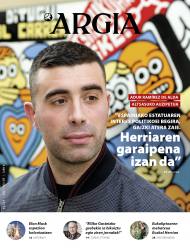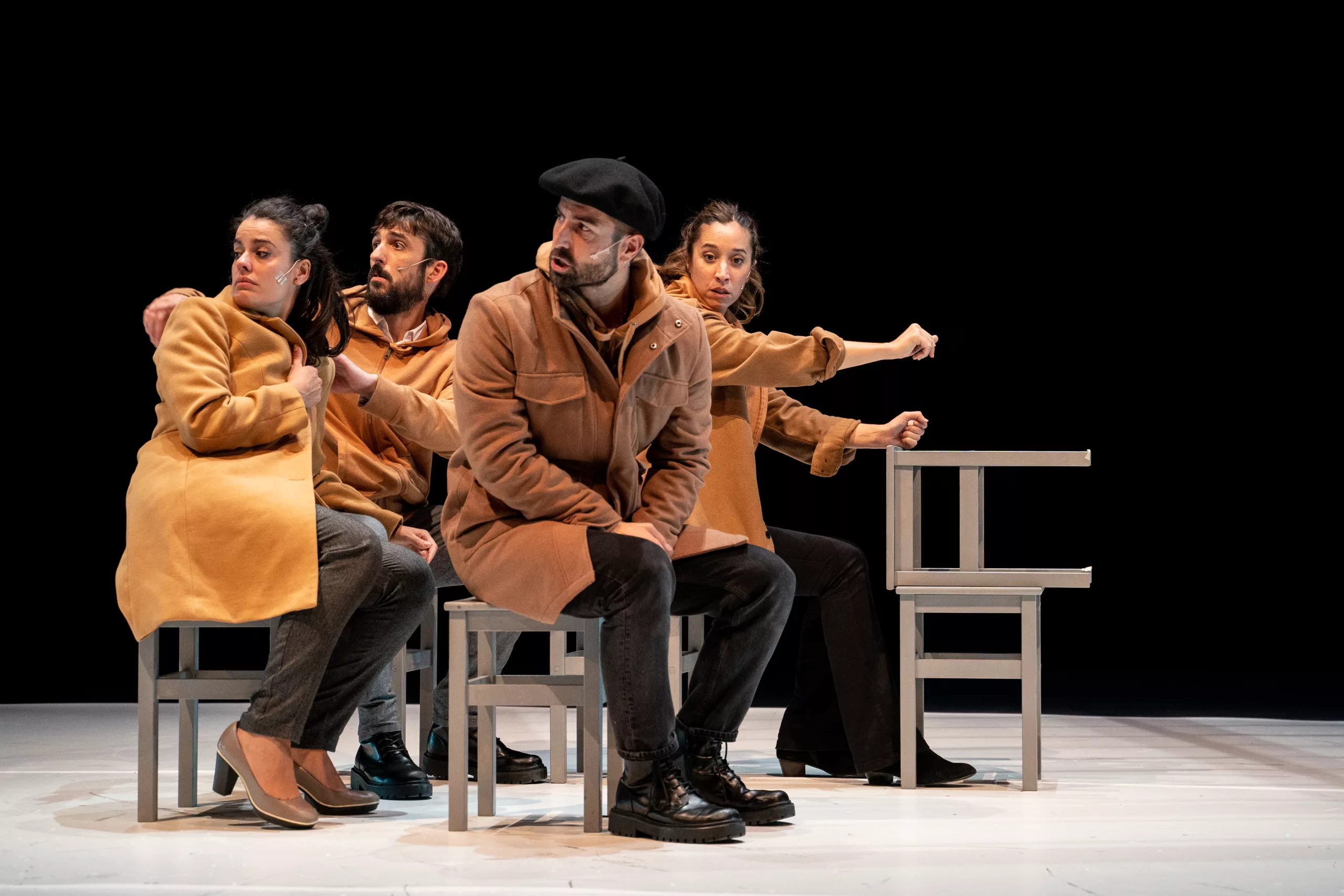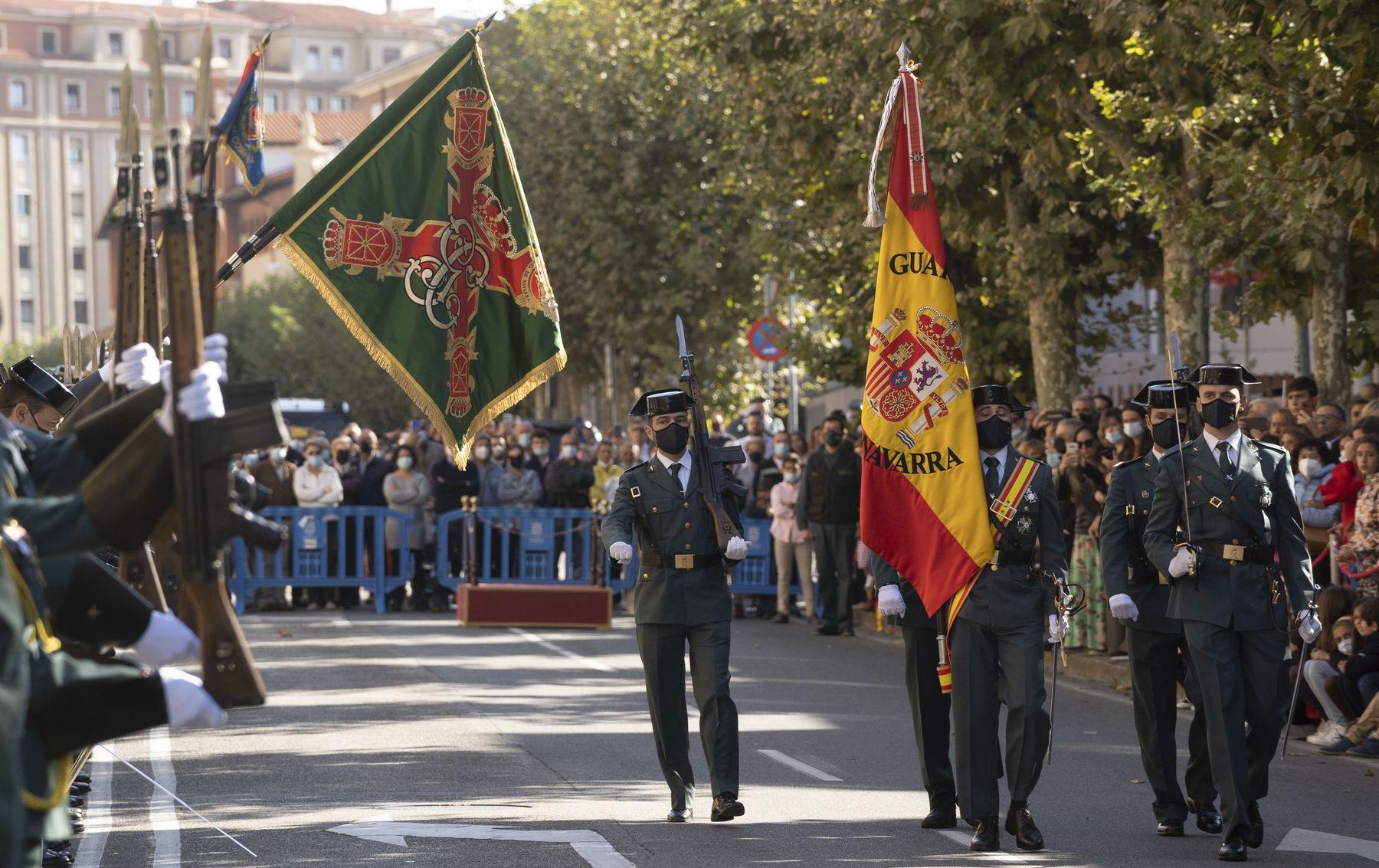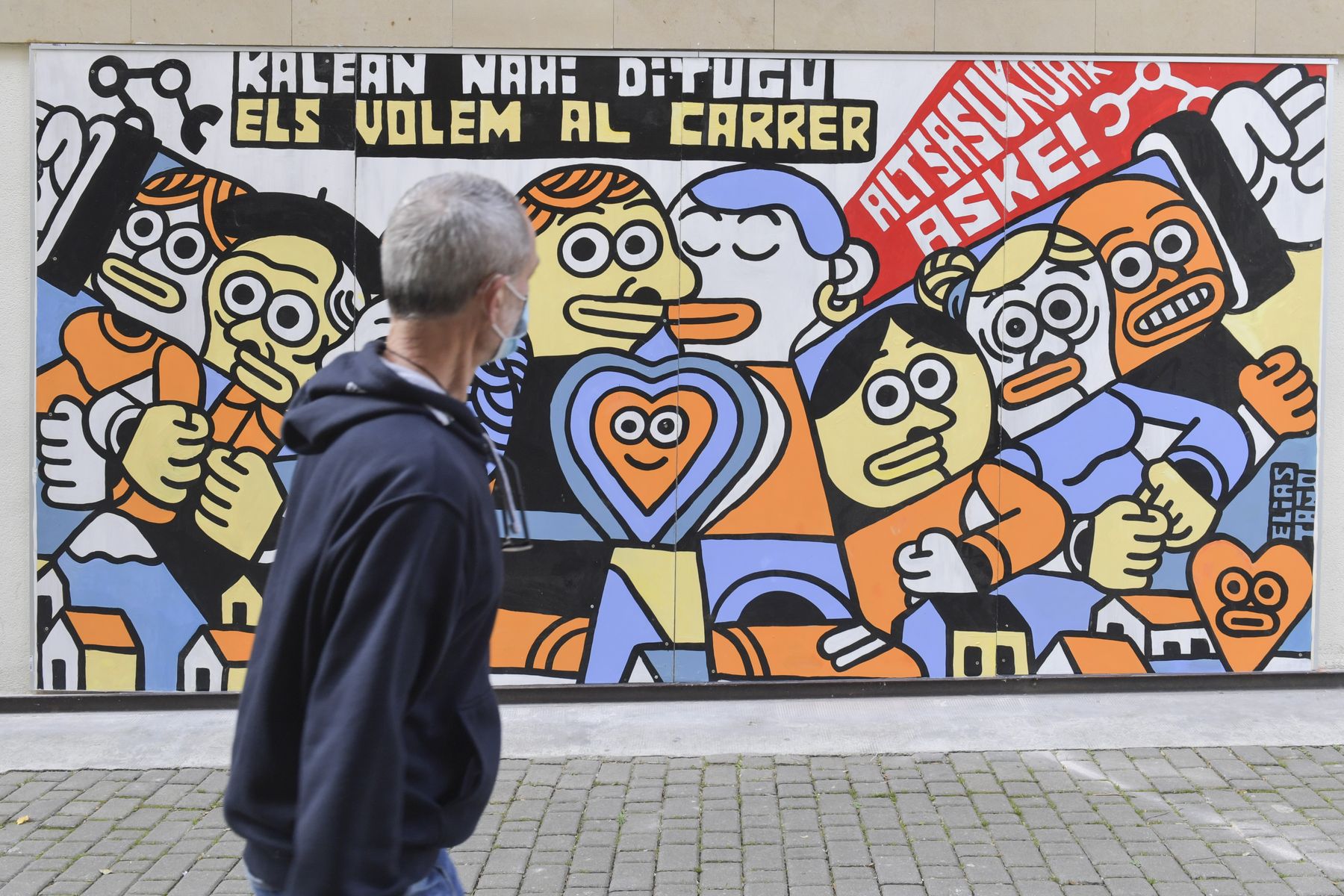"They wanted to do the cartoon of Altsasu, but it's gone wrong for them."
- Four years ago “some” decided to move to the first political and media line, one of these clashes that have occurred in many parts of Euskal Herria in the last decades. Seven young people and one whole village become demons. Adur Ramirez de Alda, one of the young people who hit him in the midst of the whirlpool, was imprisoned at the age of 21. We have talked to him about the Yuckiria, the Trap, the Prison, the Solidarity and the Victory. Two weeks after Galder Barbado and Aitor Zelaia were sentenced to four years in prison. The day after Pablo Hasélen's prison. That the Spanish Civil Guard closed the Journal when they were about to comply with 18. In the village that has reminded us not to believe the official versions: Altsasu / Alsasua
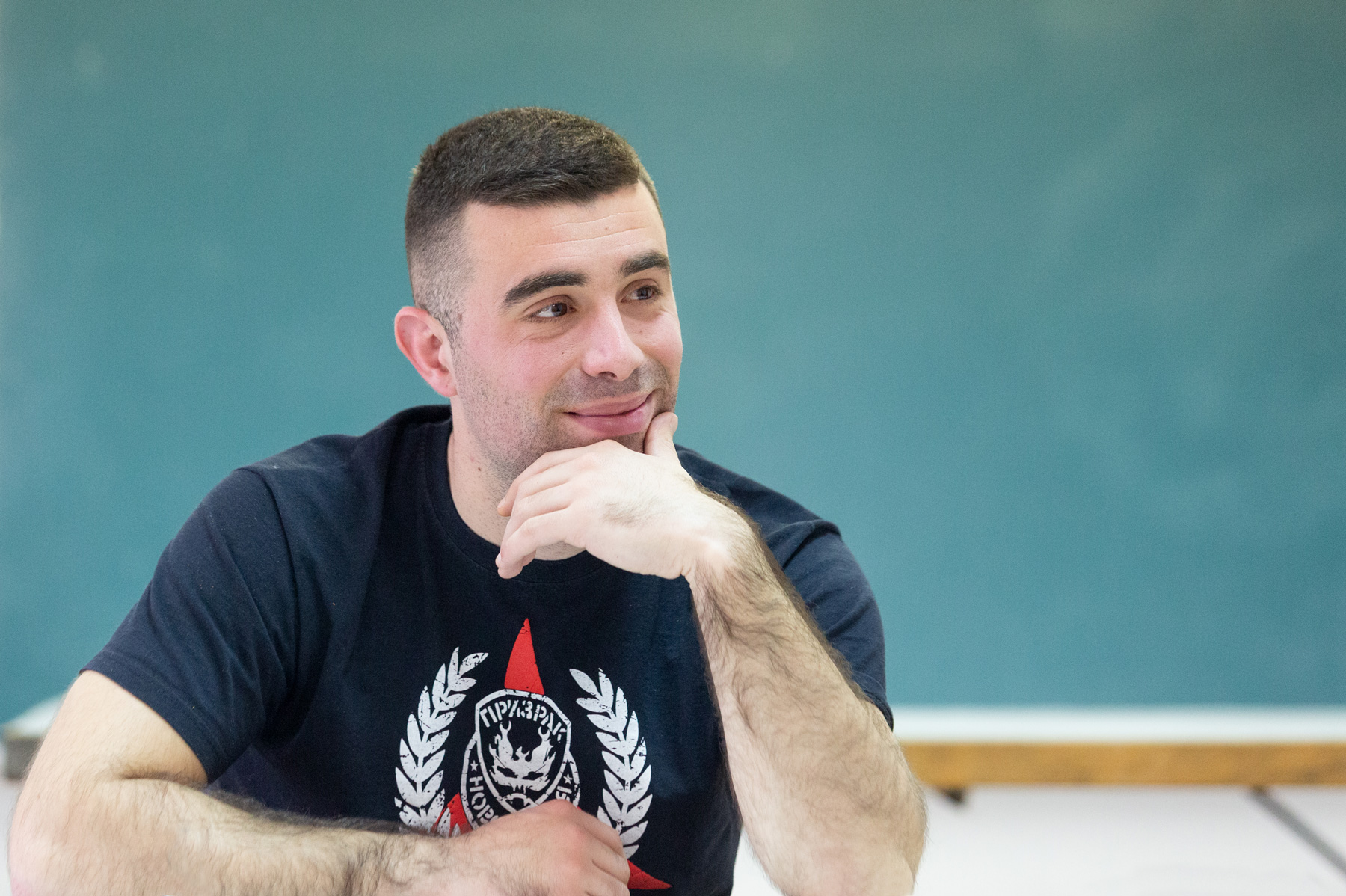
You're finishing two college careers.
On the one hand, I have the last year of Magisterium. Because, as face-to-face, I couldn't end up in prison. And on the other hand, in jail, I started studying law, and now I'm only missing the last year.
Don't say, do you want to go criminal?
Yeah, from the prison [laughs]. I liked it before all this happened. I'm very interested.
If you tell me you want to be a
judge… Don’t think about it! I would like to be a lawyer, but after doing the internship I will tell you if I hold the opinion.
What situation are you now in?
Five members are in the third grade, we have to be at 12 o'clock at home because they have put us in telematic control. Julen [Goikoetxea] and Jonan [Cob] are in the second grade. From Monday to Friday morning they leave Zaballa prison and in the evening they have to return to the interior. Lockdown weekends. They review conditions every six months. They've had it recently and, contrary to what we believed, they've been denied the change of grade.
Do you speak on your behalf, no?
Yes.
Do you feel free to talk about what happened?
Yes, but because I am how I am. In third grade, you always have an eye on it.
What is it for you on October 15, 2016?
Boom! First day of life change. We're always going to take it with us, both negative and positive. We, the family and Altsasu himself have changed us. But, eliminating everything related to the assembly, it was a normal day. Normal Friday of the fair day. Ball game, dinner with friends...
The Ospa movement noted that the incentives to the scandal were threats from civil guards: “I’m going to die to you,” “I’m going to put a shot on your face.”
In the bar there was a fight and a stop, we don't want to feed the morb. Before, however, drunkenness, I see the origin ahead. What really weighed in the civil guard reports was not what had happened that night. They had a movement between Alde Hu's eyes. The Ospa movement, the people who organized themselves in the municipality in a particular sector, and the youth in general, because in those reports many people appeared. That is what they wanted to punish from the start.

The partner of the lieutenant of the Civil Guard explained in the trial that he had not seen attacks that night, only a few pacifier cups had been thrown.
Yes, and injuries don't match your story either. There were many contradictions in the trial. It is unfounded. That's why people haven't believed and imposed our version. People saw it clear that what they were saying is not true, and that explains the great solidarity we have received next.
At the trial he said it was not in Koxka. So why do you hit you? Why you?
I'm sure they stopped me because they knew me before. The Civil Guard had photographs of many young people from the Sakana, among whom we were later charged. Someone told them “point this out” (“point this out”).
“The Ospa movement, the people organized in a certain section of the population and, in general, the youth are the ones who wanted to punish from the outset”
Charged with terrorism, the prosecutor asked for a penalty of 375 years in prison.
Yes, terrorist injuries and hate crime. They linked a political claim to the use of violence and used it to claim the need for the Civil Guard to be in Euskal Herria.
On a personal level, at the end of ETA, in 2011, I was 16 years old. So when they were talking about organic bonding with ETA, think about what they were talking about.
They have named it as an exemplary punishment. What and for whom does it serve as an example?
To make it clear that the Civil Guard is untouchable. If he argues, more so if he belongs to a political sector and to a particular country, the message is clear: the consequences will be catastrophic.
They have denounced that it has been a trap and an important part of society. But what is the assembly? The
founders are parties that form the basis of the State. Some elements of the Civil Guard, some groups of victims of terrorism, some political forces, including Navarre, who saw the opportunity to oppose the then Government of Navarra, and the judiciary itself, which maintains the exceptional doctrines in force. Without forgetting, of course, what some media are doing. They have been the main issuers of the trout.
He referred to the desire to criminalise Altsasu.
No doubt. Part of the State’s strategy has been to present Altsasu as the devil. The great victory has been that Alsasua is the one who has supported us, the people, and not just our closest ones. From the very beginning, Altsasu didn't believe what they were selling. Seeing that solidarity was very general, the Spanish State not only opposed us, but directed the attack on the Altsasu people themselves, saying that behind this broad support there was a “radical and violent” people. They wanted to do the cartoon of Altsasu. But it goes wrong.
If the trial had been held in Pamplona and not in Madrid, would the penalty have been much lower?
Who knows, maybe not.
In other words, does it need punishment for what happened that night?
If this case had not had the media and political dimension it acquired, should the fight be judged in a bar? With some injuries involved, usually yes. In any event, however, the sanction would under no circumstances be the size of what they have imposed on us. Moreover, without solid evidence, it would be possible for everyone to be free. But with us that has never been an opportunity.
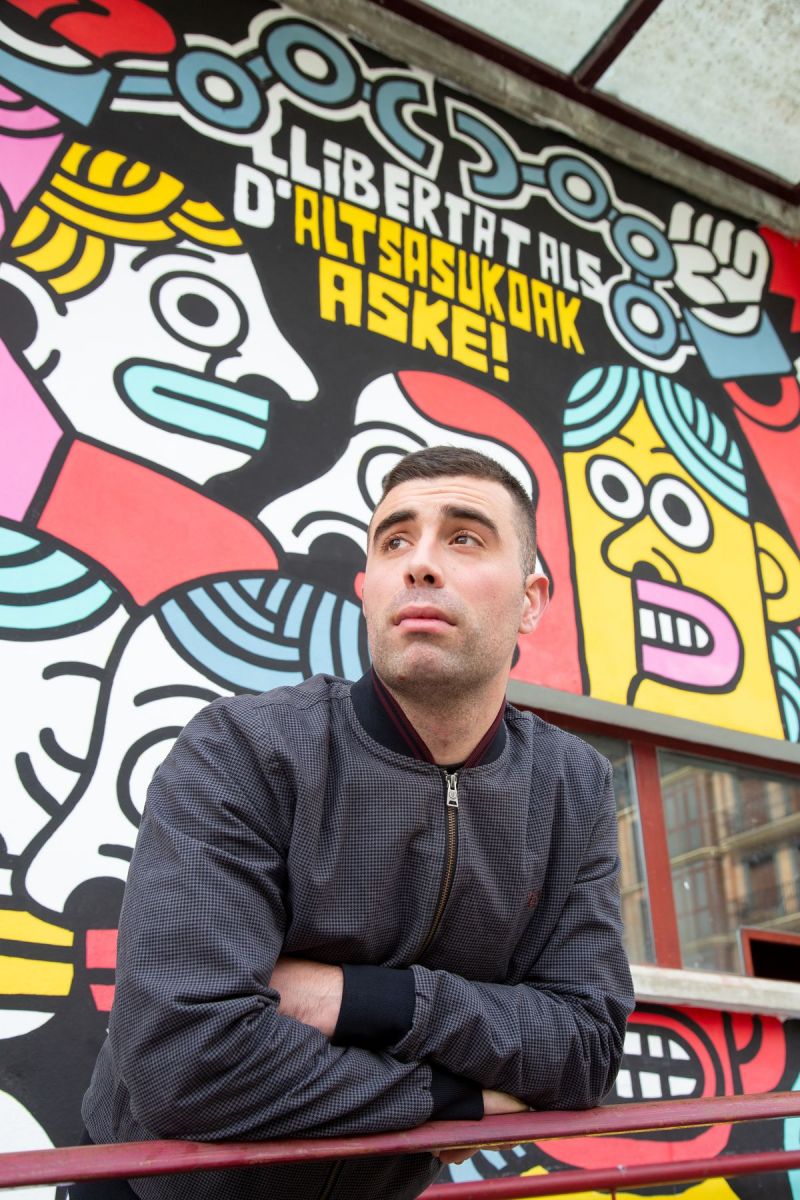
What was the 1,325 days in prison like?
Very hard. At first I was in the Special Tracking Prisoners File (FIES) and for a year and a half I was changed from module about fourteen times. That is barbaric.
Of course, the differences between prison and prison are important. Being with all the other members of Zaballa, with the intention of leaving in the short term, has nothing to do with the time when we were convicted, when he was only in Madrid prison.
“Without solid evidence it would have been possible for everyone to stay free, but with us that has never been possible.”
What lifestyle have you found in the cell?
The word is despair. And as a result, drug dependence, violence, the denunciation of other colleagues… Prison provokes anger and discomfort. There is also poverty. of Christ. They all want to get out. Some endorse the prison rules in order to achieve cuts and leave earlier, and others, especially those punishable by very heavy penalties, are desperate. And it doesn't matter. And it's all.
I have read you that you have felt one more among those who have been in jail for political militancy or other inventions in Altsasu.
We have not been part of the EPPK, because we have not been judged by our militancy. We have been prisoners related to the consequences of the political conflict, outside the time of the armed struggle. In our case, militants and non-militants, it has not been isolated, it has been part of the political conflict that Euskal Herria is experiencing.
Could it be Oñati like Alsasua has been?
Yes, because it is one of the peoples working the claim “Alde Hemen”. However, I am clear that having in Navarra had the weight to then oppose the Government of Navarra – Geroa Bai, driven by the agreement between Euskal Herria Bildu, Ahal Dugu and Ezkerraldea. So I would say that there was more chance than in Oñati, for example, in Etxarri.
What does the Civil Guard's headquarters bring to Alsasua?
I always relate the Civil Guard to suffering. It is an organization that welcomes the people. Since we were very young, we've known the Civil Guard beating, arresting, beating people. That is the contribution to the people. Today, too.
Have you had any relationship with people living in the barracks?
I don't know any of them. And I don't think we've shared similar spaces.
“I associate the Civil Guard with suffering. It is an organization that welcomes the people.”
The “relationship” between the Guardia Civil and the Barranco is not sweet. For a long time now. The
ravine has always been very active and alive on many issues. This has always had a reaction from the powerful. In the region we have two barracks, Irurtzun and Altsasu / Alsasua. The presence of the Civil Guard is suffocating, and in this pandemic situation, let us not say. But, well, the police state and the pandemic, they go hand in hand everywhere.
Do the Spanish security forces have to leave Euskal Herria?
Yes. Of course. They are in the Basque Country to deny their status as a people.

Are you another consequence of the “everything is ETA” theory?
Yes. Although I don't really like the definition of "Everything is ETA," that connection that was devised by Garzón and the company. Perhaps it would have been more important “Everything is the National Liberation Movement.”
Well, Garzón himself spoke for you saying it was an abuse.
When they exercise power, firmly, in favour of certain interests, but it is that, by leaving the responsibility, many judges, politicians and ministers change the discourse. Garzón was primarily responsible for this curious doctrine, but it is good to say so now. Both contradictory and contradictory.
One of the peculiarities of your case has been that not only in Euskal Herria, but also in the Spanish State, great support has been obtained.
The information apartheid below the Ebro has had a great influence. The wall has been effective, information has not reached many people here. At this time, new technologies make it possible to overcome this constraint and create networks of solidarity. The State remains a country with enormous media, mainly television, but in this case the information smuggling has worked. The bombardment by the media dependent on the interests of the State also served to turn the tortilla round.
“We were flirting. Flip color. Sometimes I cried when I saw that the protection was so much”
It is impossible to list all solidarity initiatives. They have been many and varied. How did he receive them?
Almost everything I've lived from jail. Since 60,000 people met in Altsasu/Alsasua, all of the following. We were flirting. Flip color. Sometimes I cried when I saw that protection was so much.
What he has received from Catalonia has particularly moved him.
The messages, the letters we have received have been impressive. We said it among us, “But what kick is going on in Catalonia?” Bo, they have also been subjected to a harsh era of repression, they see very closely what the face of the state is. The Catalans have frequently quoted me: “Yes, we knew that in Euskal Herria there were prisoners, arrests, repression, but… we didn’t catch the size, nor did we believe it entirely.” And look, now. They have also been made to open their eyes.
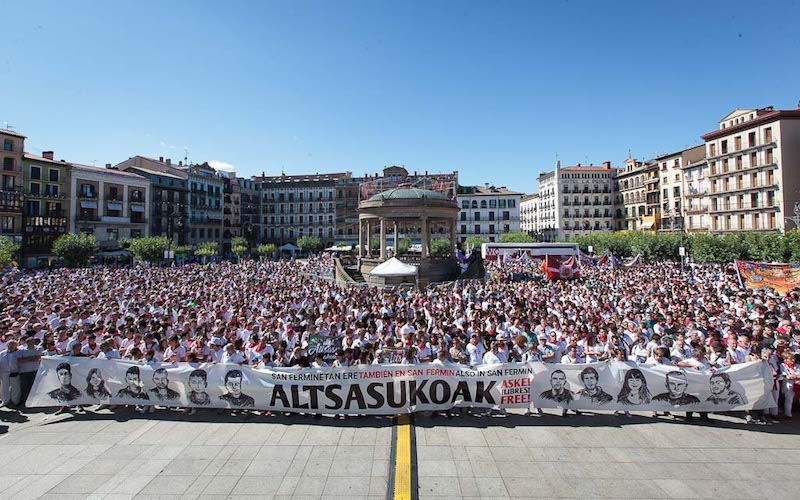
“From the moment I get up to the bed, I have the theme in my head all the time.” That is what his mother, Bel Pozueta, said.
Yes. Demash, demash! It might seem like an exaggeration, but that has been the case. I've also lived inside. In 90-minute visas, we talked about the subject and in the last minutes of the garden, of the house, of us... That was the way it was a day to day. And the truth is, it's helped me a lot to see that everyone was at a standstill. For four years it has been a very demanding militancy. Awesome. Families have given everything for their children and for society, because this has not been a personal thing. They have lived through it and still are, because many knots have not been released.
The youth movement asserts the voice of young people. In your case, instead…
Zero! [laughter].
Did you feel comfortable?
Yes and no. But look, the idea of bringing together and organizing parents came out of us. A week before we stopped, we held several assemblies in the village, and we were interested in bringing my parents to the front line. Considering that it could serve to illustrate an unusual difference in these cases. Our approach was that parents should be our voice and our ears. Of course, then it has not been quite that way, because they too have their opinion and their own speech. And that must be the case.
“Faced with the political interests of the Spanish State, they came out of size and went wrong. It has been the victory of the people”
The work done by the parents has been brutal. Not to mention the capacity of Altsasu/Alsasua and the enormous capacity of mobilization that the Askatasuna platform has had. Besides the work of other agents, Ernai carried out Christian dynamics in Navarre.
How would we act if we were out? Who knows? In any case, staying in the background has been part of our strategy.
1000 days, thousand messages, thousand kisses. In the wounds, kiss. Emotions on the front line to fight injustice. As the
injustice of our case impacted many people, many were left with the need to expel that pain. Some have told us, yes, that the emotional side has prevailed at the political level. But I believe that, although the line was mainly concerned with emotions, there were issues of great political burden, although implicitly. They've been very useful in changing people's views, and now viewed with perspective, I think it's been very politically strong.
For many years we have been used to being very hard, trying to take everything to terms of confrontation.
That such great solidarity has, for example, contributed to you being on the street now, for example, but what do you think has been effective? It has been useful for people to see clearly what the role of the Civil
Guard is here and to question the very existence of the National Hearing. It has also been very interesting from the point of view of youth, to show that the State continues to tread on us.

After five years has the play gone well to the Spanish State?
I do not think so. They have done a great deal of damage to us, to our families, to the people and to those who have had empathy with us. But from the point of view of political interests, they came out of size and went wrong. It was the victory of the people. That's what the defendants see.
The story struggle is getting faster and faster. You've seen the show about yourself on TV while on the street. The chain itself, ETB, censored a person for wearing the ‘Altsasu / Alsasua Libre’ t-shirt.
[Laughter]. Yes, it's been passed! I saw it with my friends. Surreal. It is clear that they introduced many fictional elements, with some things I did not feel very identified, but with others. The script respected, for example, what happened in the trial. We leave the criticism there, we prefer not to talk anymore, so we don't get into great waters [laughter].
What to say to all those who have expressed their solidarity?
We have commented on it many times among ourselves: How can we demonize all this? With so many, it's not possible for us. To begin with, I think it is a good contribution that we do not remain silent now, as if nothing had happened. This dialogue, for example, I put it there.
What lessons do you have?
First of all, there will be more assemblies of this kind. As the Spanish State is not democratic, there will be political dissent. And to respond, they will resort to repression, as history shows.
In our case, the key has been to look for common points among very diverse people. We have managed not to close the dynamic, to open it to the fullest to create the largest networks of solidarity. The State wants the defendants to be isolated. If they want us to join, then we have to establish alliances to extend the legitimacy of our struggle. Solidarity and unity.
Giza Eskubideen Europako Auzitegiak ez du aintzat hartu Altsasuko gazteek epaiketa bidezkoa izan zuten aztertzeko eskakizuna. Auzipetutako gazteetako batek, Iñaki Abadek, eman du jakitera berria.









